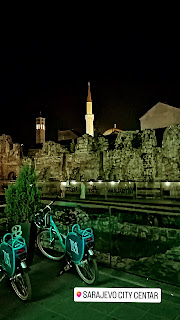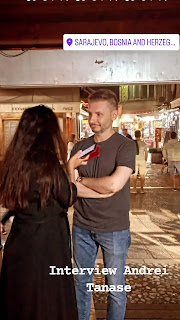From August 11 to 18, the capital of Bosnia & Herzegovina transformed into a city that never sleeps, traking over diverse venues, from cinemas to restaurants on the mountainside, and drawing guests from around the globe.
The Sarajevo Film Festival is up there with the A-listers of the continental landscape, albeit with less rigidity than its far western brothers.
It has a tenor that is both an elite and a non-conformist affair, which suits me just fine. This was my eighth year, and I’ve grown totally familiar with its practices and host city.
The 2023 edition was now an official throwback to the days prior to the plague – packed cinemas, open air and indoors, clubs and restaurants with lines around the block, DJs banging out windows, and surprising cultural nooks everywhere you turn, resulting in diversity amongst the richest in Europe.
One of these nooks, the Gallery of the Academy of Fine Arts hosted the impactful photography exhibition «The First Wartime Cinema Apollo,» which essentially kicked off my experience for the week to come.
A documentary about the close ties that grew between Sarajevo rock musicians and the Irish band U2 during the Bosnian capital's 1992-1995 siege has opened the city's annual film festival, with U2 members Bono and The Edge as star guests.
The Sarajevo Film Festival, which was founded towards the end of the Bosnian war by a group of film enthusiasts, has become southeastern Europe's largest such event, showcasing 235 films this year.
Elene Naveriani’s “Blackbird Blackbird Blackberry” won the top prize, the Heart of Sarajevo Award for best feature film, Friday at the Sarajevo Film Festival. The Georgian film, in which a stoically independent woman in her late 40s experiences an existential awakening during an affair with a local deliveryman, also won the best actress prize for Ekaterine Chavleishvili’s performance.
The award for best director went to Ukraine’s Philip Sotnychenko for “La Palisiada,” and the best actor prize was picked up by Serbia’s Jovan Ginić — who won the Louis Roederer Foundation Rising Star Award at Cannes — for “Lost Country.” Serbian director Nemanja Vojinović’s “Bottlemen” took the documentary film award.
The ceremony at Sarajevo’s historic National Theater took place beneath stormy skies, as thunder rumbled over the green hills that ring this picturesque Balkan city and arrivals did their best to strike poses on a red carpet still water-logged from evening rain showers.
It was a fittingly sober close to a festival that played out against the backdrop of a grisly crime that has left this small Balkan nation reeling.
Last Friday, in the small northeastern town of Gradačac, a man livestreamed the murder of his former wife on Instagram before killing another man and his son, injuring a further three people before committing suicide. Officials later said some 12,000 people watched the slaying live, and the video received 126 likes.
Many at Friday’s closing ceremony wore orange ribbons pinned to their lapels that were handed out by the festival as a symbol of the fight against gender-based violence.
Accepting the Human Rights Award for “Silence of Reason,” a haunting documentary about women who suffered sexual violence and torture in rape camps during the Bosnian War, director Kumjana Novakova said: “This film is really a poem for any woman who survived any kind of violence in the world…especially today for the women of Bosnia and Herzegovina. We are here, we survived and we can only make it better.”.
Of the screened films I've noticed a few that I shall probably remember in a dozen of years. Among those in competition, Sofia Exarchou’s Animal (2023) creates a sensation of acute unease, as most new Greek cinema does.
Exarchou, who has also written the film, takes us to a facet of resort/hotel life that aims to evoke pleasure for the onlookers and co-participants.
The protagonist, Kalia (Dimitra Vlagopoulou, in a Locarno festival-winning performance ), is one of the leading animateurs at a Greek hotel. She has been in the business of entertaining hotel guests for years.
The viewer senses the impact of each night, each performance in its hectic precarity, chipping away at her soul and emotional equilibrium. Kalia can recognize she is losing balance and holds on to her sanity by mercilessly inflicting another round of performance upon herself, even after a heavily draining one.
Exarchou is careful not to turn her film into a sob story. There is a fine balance between awareness of one’s agency, which may be miserable, and the liberatory impulse that knows no way out of the dark.
Exarchou’s film occupies a strange, disconcerting space somewhere in between.
THe georgian highly awarded film never acts with high drama, only a rigid, stern admission of circumstances and long-term actions of both one and the other. But the vision signals something of a fissure in the life whose rhythms Etero (Eka Chavleishvili) felt she had reins on. It sharpens an acute recognition of the mundane texture of her life. Suddenly, everything acquires a clearer edge to them.
This sturdy woman has been running her store and pivoted her entire life wholly around it. The first thing that strikes the viewer is her having blocked off access to love and tenderness. But Naveriani shows that running a family, taking care of her brother and father all on her own, yet being subject to their immense stranglehold took a psychological toll on her. These two men haunt Etero, both of whom have controlled her life. She feels she can still hear their call for her. She strikes by being cold and bitter.
The filmmaker builds the inner world through a keen sense of the languorous, sensuous, and rich attuning to a woman discovering a thickly concealed self after the sexual encounter. Deep within, she is desperately vulnerable and lets no one glimpse even a flash of that crumpled self she protects so fiercely.
But the film also packs humor and hilarity with a strong punch. A scene where a bunch of middle-aged women exchanges lewd jokes about Viagra and male virility enlivens the film’s wan mood and feels refreshing in its sexual candor.
Although several dramatic moments seem to be out of tune with the story we are following, even if the actress chose a sometimes tiring Buster Keaton style, the director Naveriani creates a protagonist who demonstrates a moving, winning receptiveness to the world, to new sensations, and the impulses of the young.
The magnificent final shot brims with ambiguity, astonishingly modulated by Chavleishvili, and washes away most sins of this bizarre film.
All in all, it was an interesting and entertaining week. Though affected by the horrific, Instagram-streamed femicide that yielded a national day of mourning (ultimately causing the festival’s expansion into the 19th), Sarajevo remained itself through and through.
And, in this day and age, sometimes that is the freshest breath of air there is.
Sarajevo, August 18th, 2023

.jpg)










.jpg)
No comments:
Post a Comment